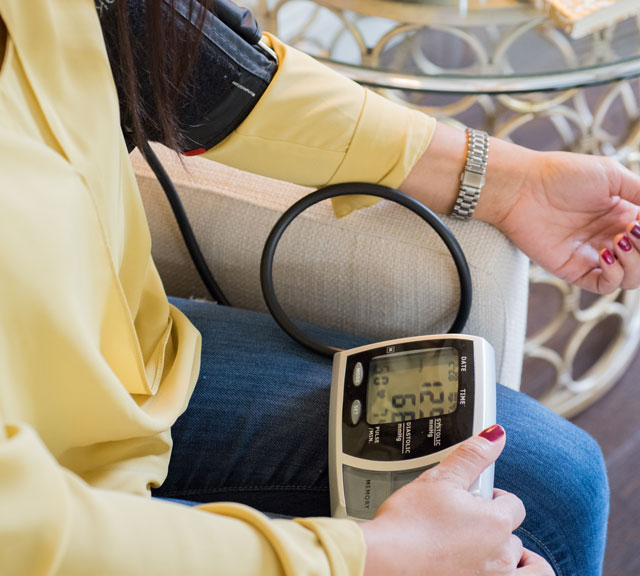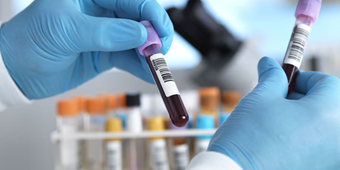- Cardiology And Vascular Health
- Health Topics
- Heart And Vascular Disease Prevention
- Heart Disease Risk Factors
Show Stubborn High Blood Pressure Who’s Boss

Find Your Perfect Match
Answer a few questions and we'll provide you with a list of primary care providers that best fit your needs.
You take your high blood pressure medicine like clockwork. You’ve improved your diet and even started exercising. Regardless, your high blood pressure numbers just won’t budge.
It might help to know that you’re not alone.
According to the American Heart Association, nearly half of American adults have high blood pressure, defined as having an average blood pressure reading of 130/80 or higher.
When you have high blood pressure, as your blood is pumped through your body, it pushes against the walls of your blood vessels with too much force. If it's left untreated, hypertension can damage your arteries and lead to a number of serious health problems, including stroke, heart attack and heart failure.
Dr. Srikanth Sadhu explains how high blood pressure can negatively affect your heart and coronary arteries.
Click play to watch the video or read video transcript.
Hypertension is most often treated with a combination of medication and recommended lifestyle changes (such as lowering the amount of salt in your diet, losing excess weight, and exercising more).
However, for some 20 percent of patients with high blood pressure, the typical course of treatment does not successfully lower their blood pressure, despite their best efforts. They have resistant hypertension (high blood pressure).
Treatment of resistant hypertension is aimed at fine-tuning your medications and making sure you're doing everything you can to successfully manage your lifestyle choices.
How Is Resistant Hypertension Defined?

Your hypertension will be classified as "resistant" if the following three conditions are all met:
- You're taking three different medications for blood pressure at their highest tolerated doses.
- One of the three medicines is a diuretic, a drug that helps to remove fluid and salt from your body.
- Your blood pressure stays higher than 130/80.
In some cases, hypertension might seem to be resistant but may actually be the result of other factors, such as poor lifestyle habits or conflicting medications. Either way, it's important for you to work with your doctor to help you get to the bottom of the problem and get your blood pressure under control.
About 25 percent of people with resistant hypertension are found to have a secondary medical condition that's complicating the problem. Some possible causes of this "secondary hypertension" can include:
- Sleep apnea
- Narrowing of the artery delivering blood to the kidneys
- Constriction or narrowing of the aorta (the body's largest artery)
- Kidney failure
- Certain types of hormonal disorders
How Is Resistant Hypertension Treated?
In cases of secondary hypertension, treatment must address the underlying conditions that are creating those secondary problems. In the 75 percent of cases that are not caused by a secondary medical condition, treatment of resistant hypertension is aimed at fine-tuning your medications and making sure you're doing everything you can to successfully manage your lifestyle choices.
Medicines. Not all patients respond to medications in the same way. It often happens that patients will need several medicines to get the job done, and it can take time for your doctor to work out the ideal balance and dosages of the various drugs you might be taking.
Other substances. Be sure to tell your doctor about any other medications you’re taking, as well as supplements, stimulants (such as caffeine or tobacco), and any recreational drugs or alcohol you may use. Some of these can increase your blood pressure or react negatively with the medicines you’re taking to control your hypertension.
Lifestyle. Regrettably, we don't always make the choices that are best for our health. In fact, it's possible that your lifestyle choices may be the reason you developed hypertension in the first place. If these choices have developed into habits, they can be difficult to change. Even so, taking firm control of them now is a crucial part of getting your high blood pressure under control. Some areas of particular concern include:
- Sodium (salt) intake. Sodium will raise your blood pressure. Learn to reduce the amount of salt in your diet. And pay careful attention to the sodium that comes along with many processed foods.
- Cigarette smoking. Smoking can narrow and stiffen your arteries, raising your blood pressure. Your health care provider can give you information to help you quit smoking.
- Lack of exercise. Regular exercise is important to your overall health and can actually help to lower your blood pressure.
- Poor medication habits. It's important to stick to the medication dosages and schedule that your doctor prescribes as you work together to overcome your high blood pressure.
Dr. Srikanth Sadhu talks about lifestyle changes that can help control blood pressure.
Click play to watch the video or read video transcript.
Working Together
Success will require working closely with your doctor, who will track your progress, adjust your medications as necessary, and offer detailed advice that can help you win the battle with resistant hypertension.
Find Your Perfect Match
Answer a few questions and we'll provide you with a list of primary care providers that best fit your needs.
Source: Harvard Health Publishing; America Heart Association; Johns Hopkins Medicine; Srikanth Sadhu, MD, Premier Cardiovascular Institute






